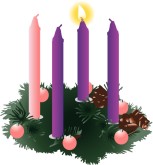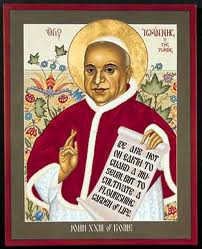...Not this one
But this one...
Fiat: Latin for "yes". Without her "yes" where would we be? Take some time to read this excellent article by the Liguorians. Mary's Fiat: All beginnings start with a yes.
Saturday, December 17, 2011
Friday, December 2, 2011
New Beginnings - The World is Being Remade
In his homily for the second Sunday of Advent, Father Robert Barron of Word on Fire Ministries preaches on the Gospel of Mark and explores the theme of preparing a highway for the Lord. Find 15 minutes to listen to this podcast of the homily...it'll be well worth the time taken on your journey in Advent.
Saturday, November 26, 2011
Advent - a time of preparation
Beginning the Church's liturgical year, Advent (meaning, "ad-venio in Latin or "to come to") is the season leading up to the celebration of Christmas. The Advent season is a time of preparation that directs our hearts and minds to Christ’s second coming at the end of time and also to the anniversary of the Lord’s birth on Christmas. Advent devotions remind us of the meaning of the season. Special Advent devotions include the lighting of the Advent wreath; the Advent calendar which helps remind us of the season with daily thoughts and activities; Advent prayers that prepare us spiritually for the birth of Jesus Christ.
 The use of the Advent Wreath is a traditional practice which has found its place in the Church as well as in the home. The blessing of an Advent Wreath takes place on the First Sunday of Advent or on the evening before the First Sunday of Advent. When the blessing of the Advent Wreath is celebrated in the home, it is appropriate that it be blessed by a parent or another member of the family.
The use of the Advent Wreath is a traditional practice which has found its place in the Church as well as in the home. The blessing of an Advent Wreath takes place on the First Sunday of Advent or on the evening before the First Sunday of Advent. When the blessing of the Advent Wreath is celebrated in the home, it is appropriate that it be blessed by a parent or another member of the family.
All make the sign of the cross as the leader says:
Our help is in the name of the Lord.
Response (R/.) Who made heaven and earth.
Then the Scripture, Isaiah 9: (lines 1-2 and 5-6) or Isaiah 63 (lines 16-17 & 19) or Isaiah 64 (lines 2-7) is read:
Reader: The Word of the Lord.
R/. Thanks be to God.
With hands joined, the leader says:
Lord our God,
we praise you for your Son, Jesus Christ:
he is Emmanuel, the hope of the peoples,
he is the wisdom that teaches and guides us,
he is the Savior of every nation.
Lord God,
let your blessing come upon us
as we light the candles of this wreath.
May the wreath and its light
be a sign of Christ’s promise to bring us salvation.
May he come quickly and not delay.
We ask this through Christ our Lord.
R/. Amen.
The blessing may conclude with a verse from
“O Come, O Come, Emmanuel”:
O come, desire of nations, bind
in one the hearts of humankind;
bid ev’ry sad division cease
and be thyself our Prince of peace.
Rejoice! Rejoice! Emmanuel
shall come to thee, O Israel.
 The use of the Advent Wreath is a traditional practice which has found its place in the Church as well as in the home. The blessing of an Advent Wreath takes place on the First Sunday of Advent or on the evening before the First Sunday of Advent. When the blessing of the Advent Wreath is celebrated in the home, it is appropriate that it be blessed by a parent or another member of the family.
The use of the Advent Wreath is a traditional practice which has found its place in the Church as well as in the home. The blessing of an Advent Wreath takes place on the First Sunday of Advent or on the evening before the First Sunday of Advent. When the blessing of the Advent Wreath is celebrated in the home, it is appropriate that it be blessed by a parent or another member of the family.All make the sign of the cross as the leader says:
Our help is in the name of the Lord.
Response (R/.) Who made heaven and earth.
Then the Scripture, Isaiah 9: (lines 1-2 and 5-6) or Isaiah 63 (lines 16-17 & 19) or Isaiah 64 (lines 2-7) is read:
Reader: The Word of the Lord.
R/. Thanks be to God.
With hands joined, the leader says:
Lord our God,
we praise you for your Son, Jesus Christ:
he is Emmanuel, the hope of the peoples,
he is the wisdom that teaches and guides us,
he is the Savior of every nation.
Lord God,
let your blessing come upon us
as we light the candles of this wreath.
May the wreath and its light
be a sign of Christ’s promise to bring us salvation.
May he come quickly and not delay.
We ask this through Christ our Lord.
R/. Amen.
The blessing may conclude with a verse from
“O Come, O Come, Emmanuel”:
O come, desire of nations, bind
in one the hearts of humankind;
bid ev’ry sad division cease
and be thyself our Prince of peace.
Rejoice! Rejoice! Emmanuel
shall come to thee, O Israel.
The Rite of Welcome and Acceptance
The secular world seems to begin the celebration of Christmas earlier and earlier each year - a fact demonstrated most blatantly by the expansion of Black Friday creeping intrusively into our quiet holiday of giving thanks. Perhaps unnoticed by many who are busy with shopping and decorating this weekend, comes the first Sunday of Advent and its annual observation of the Rite of Welcome and Acceptance in the Roman Catholic Church.
This Rite is a beautiful addition to our Sunday liturgy as we as a parish welcome those who have been participating in the discussions of the Inquiry Group since September. We now have the opportunity to extend a welcome to those who are ready to begin a new period of discussion and learning - the Period of the Catechumenate. Our Inquirers will now be Candidates (those baptized Christians coming from the traditions of our Christian brethren) and Catechumen (those who are not yet baptized).
Please pray for Candidates and Catechumen who throughout the world are participating in the Rite of Welcome in Catholic liturgies this weekend. Please also pray for anyone who is on a journey, searching for God. We walk with them this Sunday and always.
This Rite is a beautiful addition to our Sunday liturgy as we as a parish welcome those who have been participating in the discussions of the Inquiry Group since September. We now have the opportunity to extend a welcome to those who are ready to begin a new period of discussion and learning - the Period of the Catechumenate. Our Inquirers will now be Candidates (those baptized Christians coming from the traditions of our Christian brethren) and Catechumen (those who are not yet baptized).
Please pray for Candidates and Catechumen who throughout the world are participating in the Rite of Welcome in Catholic liturgies this weekend. Please also pray for anyone who is on a journey, searching for God. We walk with them this Sunday and always.
Tuesday, October 25, 2011
Monday, October 17, 2011
St. Peter Young Adult Fellowship
If you consider yourself to be a "young" adult, we have a group that meets informally every third Saturday of the month for fun, fellowship and discussion. You don't have to be Catholic or confirmed to join in.
This group, that consists of single and married 20 and 30 somethings, meets at local gathering places like Bek's or Arris's or sometimes at the church. Babysitting is provided. If you'd like to know more contact Nicole Waters at watersnp@missouri.edu and watch our parish bulletin for additional information.
This group, that consists of single and married 20 and 30 somethings, meets at local gathering places like Bek's or Arris's or sometimes at the church. Babysitting is provided. If you'd like to know more contact Nicole Waters at watersnp@missouri.edu and watch our parish bulletin for additional information.
Wednesday, October 12, 2011
Saints and Feast Days
In our second Inquiry session, we discussed Saints, The Communion of Saints, the church's process of officially declaring a person to be a saint and why we revere saints.
Often, a saint's feast day is on the day of his or her birth or death, but it can also be on the anniversary of a significant event in that saint's life. Such is the case with Blessed Pope John XXIII, the pope responsible for bringing about the second vatican council. 49 years ago on October 11, Vatican II was convened and that is the feast day of John XXIII.
"What the great Pope John brought to the world, and what the Council he called emphasized, was a “novus mentis habitus” — a “new way of thinking” — about the world and the Church. Pope John Paul II used to speak about this quite often in the early days of his own papacy: that the world and the church today demands a new way of thinking about how we relate to the people with whom we live and serve. Today, this message seems more needed than ever." ---Deacon Bill Ditewig, author of the blog, "Deacons Today: Dalmatics and Beyond.
Often, a saint's feast day is on the day of his or her birth or death, but it can also be on the anniversary of a significant event in that saint's life. Such is the case with Blessed Pope John XXIII, the pope responsible for bringing about the second vatican council. 49 years ago on October 11, Vatican II was convened and that is the feast day of John XXIII.
"What the great Pope John brought to the world, and what the Council he called emphasized, was a “novus mentis habitus” — a “new way of thinking” — about the world and the Church. Pope John Paul II used to speak about this quite often in the early days of his own papacy: that the world and the church today demands a new way of thinking about how we relate to the people with whom we live and serve. Today, this message seems more needed than ever." ---Deacon Bill Ditewig, author of the blog, "Deacons Today: Dalmatics and Beyond.
Subscribe to:
Posts (Atom)





